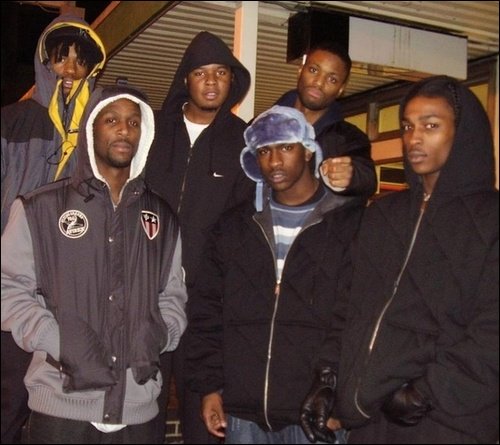
The Dummy guide to Skepta
Once in a generation, someone will rise up through the cracks of their chosen discipline; blowing it wide open, and changing it forever. Skepta must have just never got the memo that you’re only meant to do this once.
Having quickly emerged as the hottest MC in the scene during the early days of grime; pretty much single-handedly breaking it to the UK mainstream; then the States, and then the rest of the world – it’s no surprise why the majority of rappers in the country herald him as the uncontested king of the scene.
With such a longstanding and influential career under his belt, you’d be forgiven for forgetting some of what the now-36-year-old has done since starting out, but we’re here to take you through the various albums, freestyles, highs, and lows – in order to gain a complete view of the musical visionary.
Skepta was born as Joseph ‘Junior’ Adenuga to Nigerian immigrant parents in 1982, with the family moving to Tottenham’s Meridian Estate after the three-year-old burnt down his family home by accidentally setting fire to a teddy bear.
Before ever seriously picking up the microphone, the young creative known as Skepta (the name derived from the word “sceptre”) started out behind the decks, dextrously mixing tunes for the North London-based Meridian Crew. During this time, he released a number of instrumentals including ‘DTI (Pirate Station Anthem)’ and ‘Private Caller’. Famed for their outrageously ‘road’ bars, the Meridian Crew embodied the spirit of gangsta rap and made it their own within the UK.
The crew consisted of Big H, Paper Pablo, President T and Bossman (below), all of whom made names for themselves on North London pirate radio stations. Skepta’s brother JME was also part of Meridian and, with the group having weekly slots on Heat FM and Deja Vu 92.3FM, they started to cause a big noise in the early days of the scene.

After the group dissolved in 2005, Skepta and JME joined Roll Deep – another crew, before starting up their own, now iconic group/record label, Boy Better Know, in 2006.
Boy Better Know, or ‘BBK’, are now recognised as the leading example to follow for independent labels, pushing back against the influences of the mainstream industry, and carving out their own path to success. The crew has boasted some of the biggest names in grime throughout the years, such as Wiley, Frisco, Jammer and Shorty, who, individually and collectively have contributed to significant parts of grime music history.
Like Skepta’s previous crews, BBK had a strong pirate radio presence, appearing regularly with DJ Maximum on Rinse FM – the station started in 1994 by a group of sixteen-year-olds, including Geeneus and DJ Slimzee, going on to be one of London’s biggest illegal stations, and kickstarting the careers of the likes of Dizzee Rascal and Wiley – before earning its professional license in 2010.
The year 2006 saw one of Skepta’s most prestigious and iconic clashes, between him and Birmingham’s MC Devilman. It was the second instalment in the Lord of the Mics (LOTM) series started by BBK’s Jammer, and proved to the community that grime music was alive and thriving in boroughs other than London.
Since the battle, areas such as Manchester and Birmingham have boasted a roster of technically gifted artists that have since driven up the competitiveness of lyrical styles and wordplay, allowing the music to develop and blossom into the eclectic cult status it now holds.
LOTM proved to be a great advertisement for grime, with young artists from opposing areas or backgrounds coming together; aiming to beat their opponent purely with words and skill as opposed to acts of violence. Jammer famously said that if you lift your hands to anyone in a clash it shows you were “weak” – demonstrating the respect that flowed through the community during the early days.
In 2007, Skepta released his debut album ‘Greatest Hits’ through Boy Better Know’s label. Possibly one of the artist’s most under-appreciated albums for what it was in the grand scheme of things, it perfectly embodied the mood of grime music, and himself as a person at the time.
The record includes hits that still light up sets to this day, such as ‘I Spy’ and ‘Doing It Again’ – putting to use the MC’s razor-sharp flows and hard-hitting, catchy lyrics. Opener ‘The Journey’ talks us through the inception of the rapper: from his own physical birth to the birth of the artist ‘Skepta’, while ‘Ayia Napa 2006 Skit’ includes recordings from his time incarcerated in the foreign jail.
The album serves as the soundtrack for the restless street kids of the era, whilst also teasing all the signs of a superstar in the making. Skepta had previously released mixtapes such as ‘Joseph Junior Adenuga’, but ‘Greatest Hits’ proved the Tottenham rapper could hold his own in the album game; setting him up for the next decade of domination.
If you were to think back through the countless number of freestyles across the years, only a small number would have graduated to ‘legendary’ status. Chip’s baby-faced freestyle from when he was just sixteen with Wiley and Ice Kid would have to make the list, so would Nines’ Fire in the Booth and, in many people’s eyes, Skepta’s Tim Westwood TV appearance.
Considering the video came out in 2008, the variety of styles and flows Skepta used seemed to be ahead of his time; spitting over the Bless Beats-produced instrumental from Wiley’s ‘Wheres My Brother’. Similar to how Wiley utilised his vocals on the original song, Skepta came through fiercely, donning an ice-cold, all white outfit, with a stylised blend of bars and melodies – one which is growing increasingly popular in the modern age – and over the course of nine minutes, produced two sets of rhymes that were to go down as one of the best freestyles in the UK to this date.
Despite how well the freestyle was received, there was an obvious elephant in the room that could be heard (or not heard) interfering with the MC’s bars – most of what he was saying was being censored. Although censorship still exists in freestyles nowadays (depending on the extremity of what the rappers are saying) – in 2008, the lid was screwed on much tighter when it came to what could be aired on mainstream channels or not. The freestyle took place on Tim Westwood’s old daytime show for Radio 1Xtra and, although being a BBC commissioned programme where you’d expect to see some censorship, many fans picked up on the severity of it that Skepta faced, with words like ‘Gaza’ and ‘Osama’ mixed out of existence.
As grime music got more popular, it was becoming exponentially ‘edgy’ in the eyes of the mainstream, and it became increasingly clear that if you were an artist who wanted your song to chart, it was going to have to be diluted to suit the masses, or most of your lyrics would be censored. Grime wasn’t the underground phenomenon it was a few years prior, and it seemed that, for it to have wheels commercially – things would have to change.
In the same year as the iconic Westwood freestyle, Skepta released a song that would subject him to a significant amount of stick from the grime community. On 15th September 2008, ‘Rolex Sweep’ arrived for digital download, peaking at 86 in the UK charts and becoming the lead single off of his 2009 album ‘Microphone Champion’.
The track marked Skepta’s most obvious shift away from his signature sound at the time, with some people arguing that he was selling out by opting for commercial success. The tune was released with an equally cheesy music video (although in 2008, it would be hard to find a video that wasn’t cheesy when looking back from a modern perspective), with the rapper performing a sort of macarena in a pub with builders and a dwarf dressed up as Michael Jackson.
Despite the single, Skepta’s next album ‘Microphone Champion’ sought to address his doubters, releasing a straight-up grime record featuring the likes of Wiley, Giggs, Trigga, and his old Meridian Crew member, President T. The album was received with mixed feelings, with many enjoying it yet some feeling like it was a diluted version of the MC, with the intention of being a money-spinner rather than a boundary-pushing album.
The project’s opener ‘Reflecting’ nodded towards the criticism of ‘Rolex Sweep’, saying: “Everyone’s talking, talking, talking / Ah Rolex Sweep, Sunglasses at Night / Them man ain’t real, that’s a joke ting cuz / Man has never been bad up in the music ting”. The MC chose to position his commercial success as proof of his versatility in the music business – going on to rap: “They don’t know how to make a tune for the mainstream, radio, road man / and the stage show at one time”.
The days of 2010 saw Skepta start to blow up as a serious chart-scaling artist. That year, the rapper released a number of music videos for singles that were to feature on his 2011 album ‘Doin’ It Again’.
Tracks like ‘Cross My Heart’ featuring Preeya Kalidas, placed significantly more mainstream sounds in the chorus of the songs, while Skepta filled in the verses with his grime-style lyrics. This model continued with success over the next year – 2011’s ‘Hold On‘ featured a rock band in the backing music, with Skepta posing as the frontman in the subsequent video.
The release of his third album ‘Doin’ It Again’ continued this success, charting at number 19 in the UK album charts. However, the album strayed further from Skepta’s underground roots than ever before, and accusations of selling out grew stronger than ever. Could it really be that the King of grime sold his soul for money and success, even at the cost of his roots?
Not according to Skepta, who, on ‘So Alive‘ with N Dubz, confidently spat that “even a blind man could see / I would never sell my soul for the P / When you’re looking at Skepta, you’re looking at grime / so the only thing I gotta stay true to is me”.
Skepta introduced to the masses the cutting-edge flows and lyrical styles of grime with his commercial hits. He was the tip of the iceberg, introducing himself into a new audience that would eventually help him, and the rest of the scene, sky-rocket to the peak of the music industry a few years later.
Around the time that Skepta released ‘Doin’ It Again’, a sad truth was starting to resonate throughout the grime community – the scene was dying a slow and painful death. The industry was yet to see the potential that the underground movement held in buckets, and its earliest and dearest stars such as Chip, Dizzee, Tinchy Stryder and Skepta himself were going down the root of commercial appeal and chart-reaching ‘bangers’.
An overriding American influence was dominating everything within the UK: sound, style and flows – and the glory days of LOTM felt like a distant, hazy memory. “The game was going this way and I had to reshape it, like knock it back to London and what we do,” Skepta said about ‘Blacklisted’ in a recent interview. The 2012 record worked off of the MC’s newly-acquired commercial value; bringing back the spirit and energy that had been noticeably lacking across the last few years.
Standout track ‘Ace Hood Flow’ described the state of the UK music industry at the time, energised by a new lease of life in Tottenham rapper – a new confidence – as though everything up to this point had all happened for a reason and, now, it was about to change.
And then just like that, the man that had been gracing our charts with his various pop/grime hybrid songs for the last four years went eerily quiet. No charting songs, no nothing. His next album wouldn’t release for another four years, but by that point, everything had already changed.
Skepta, although absent, had his finger placed firmly on the trigger. After two years of silence from the MC, he released ‘That’s Not Me’ to the world – the tune that was to singlehandedly shoot real, gritty, grime music back to the forefront of everyone’s minds. The track embodied everything grime is about: a blisteringly hard instrumental, unapologetic bars, live mixing, and an anti-commercial, home-made music video with a shoestring budget of just £80. Skepta was back, and he brought back the whole scene with him.
If ‘That’s Not Me’ marked the return of a long-lost king, ‘Shutdown’ shoved the crown firmly back on his head and gave him the keys to the kingdom. It’s a rare phenomenon for one song to have such a significant impact on culture – but this one preceded all possible expectations. ‘That’s Not Me’ brought back grime, but ‘Shutdown’ made it massive. Suddenly, grime was everywhere, and with the release of Stormzy’s ‘Shut Up’ coming out at a similar time, the underground subset of UK rap and garage that had been bubbling away for years was now, finally, mainstream.
A new age of grime fans came into existence during this period along with a new generation of MCs who were seeing some of the crazy views that other people were getting for spitting over a grime beat and uploading it to YouTube. The scene was thriving and a new youth culture materialised into existence; rebelling against the status quo, and rapping about it in their songs. It was grime 2.0, and in the age of social media it spread like a wildfire – giving kids a modern day punk spirit.
Putting on an illegal show in a Shoreditch car park served to show the galvanising impact his song had had on the youth, and grime music in general. Shows such as these would have been a pipe dream back in the MC’s old pirate radio days, and despite the windy course of cheesy pop songs he took to get to his point, it was now a reality.
In 2016, the highly anticipated, Mercury Award-winning album ‘Konnichiwa’ dropped, featuring the two larger-than-life songs ‘That’s Not Me’ and ‘Shutdown’, as well as hits such as ‘It Ain’t Safe’ featuring Young Lord, and ‘Ladies Hit Squad’ with D Double E and A$AP Nast. The record proudly sticks both middle fingers up to the establishment – calling out the police, the media, the music industry, and the people that haven’t stuck by him. What set this record apart from his past slew of songs on albums like ‘Microphone Champion’ and ‘Doin’ It Again’ was a new sense of emotion – you felt Skepta’s sense of purpose, with every ounce of himself put into it.
This year’s ‘Ignorance Is Bliss’ acts as the latest instalment in the rapper’s illustrious career; a seamless blend of introspective lyrics and reactive instrumentals. The record dropped at an interesting time in the rapper’s life, coming shortly after the birth of his baby daughter, and served to offer a glimpse inside the mind of the creative who has been in the game for so long. The result is a mature sound – the most complete and fulfilling record the artist has released to date – and features huge modern day artists, such as J Hus and Nafe Smallz, while also slipping back to his BBK roots, with a time machine back to 2006 on the track ‘Gangsta’.
It would be hard to deny the irreversible impact Skepta has had on UK culture and music over the course of his life. Having been there since the very inception of grime, the MC has persevered throughout the years, never straying too far from his humble beginnings; while continuing to produce songs (pop or not), that have drawn people to his culture and way of life.
In a time where UK rap artists like Dave, Fredo and Loski can regularly chart whenever they release material, it is clear that the music industry is a lot more open to the popularity of ‘street’ music – with a public that is more open to consuming it. The explosion of grime in 2015 ripped wide a huge avenue of opportunities for young artists to make something out of music, showing the country that there was more to the UK scene than the plethora of washed-up pop tunes and recycled club anthems.
Skepta has remained a prime contributory to the music we listen to today, setting trends and pioneering new sounds with ease, and it’s assured his legacy will stay etched in history, long exceeding the man himself.
Stream Skepta’s latest album, ‘Ignorance Is Bliss’:
Skepta goes back to his roots on the self-produced ‘Bullet From A Gun’













